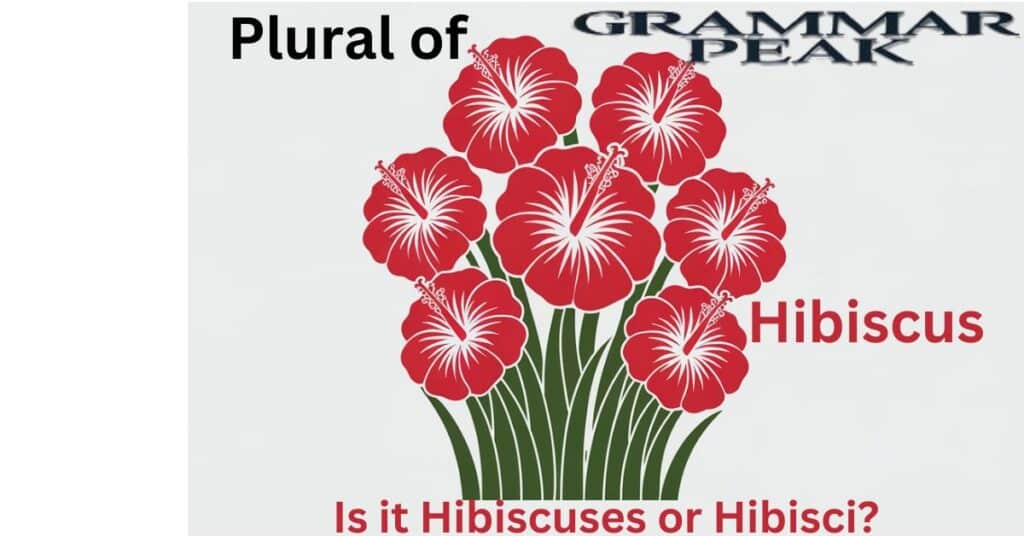The plural of hibiscus often confuses English speakers. Some say hibiscuses, while others prefer hibisci. But which is correct? Understanding English plural and Latin plural rules is key to solving this mystery.
In this article, we explore the word origins, Latin derivation, and language conventions behind this beautiful flowering plant. We also compare botanical classification, scientific names, and taxonomy to clarify the debate. By the end, you will confidently know which plural form to use!
What is Hibiscus?
The hibiscus is a flowering plant belonging to the mallow family (Malvaceae). It is widely known for its tropical flowers, which are large, and colorful, and attract pollinators like bees and butterflies. These plants thrive in warm climates, making them popular garden plants worldwide.
Hibiscus plants are not just decorative. They have medicinal and culinary uses. Hibiscus tea is made from dried petals and is rich in antioxidants. The plant is also used in cosmetics, fabric dyes, and even traditional medicine. Due to its beauty and utility, it has earned a special place in botanical nomenclature and everyday gardening.
you will like What’s the Plural of Hibiscus? Is it Hibiscuses or Hibisci?
Origins of the Word ‘Hibiscus’
The word hibiscus comes from a Latin derivation. It traces back to the Greek word “hibiskos,” meaning marshmallow plant. The Romans adopted this term, and over time, it entered English grammar.
Many botanical terms originate from Latin grammar. This is because Latin was the universal language of science for centuries. Scientists used Latin nomenclature to classify plants consistently. This is why the botanical context of “hibiscus” follows Latin rules for its singular and plural forms.
Plural of ‘Hibiscus’
The plural of hibiscus can be confusing because it follows two different rules. In English grammar, the standard plural form is hibiscuses, adding “-es” like other words ending in “-s.” However, in Latin grammar, the plural changes to hibisci, following the rule that nouns ending in “-us” become “-i” in their plural form. Both are technically correct, but their usage depends on context.
In everyday conversation and gardening, hibiscuses is the preferred term, making it more common in casual speech. However, in botanical classification and scientific names, hibisci is often used. Understanding these language conventions helps clarify which plural form to use depending on whether you’re discussing garden plants or engaging in academic usage.
Why both “Hibiscuses” and “Hibisci”?
The reason we have both hibiscuses and hibisci comes down to English plural and Latin plural rules. In English, most words ending in “-s” form their plural by adding “-es”, which is why hibiscuses is widely accepted in everyday language. On the other hand, in Latin grammar, nouns ending in “-us” typically change to “-i” in their plural form, which is why some prefer hibisci in botanical classification and scientific names.
Both forms are correct, but their usage depends on contextual meaning. In casual conversation or gardening discussions, hibiscuses is the preferred choice. Meanwhile, in academic usage, particularly in taxonomy and botanical nomenclature, hibisci is sometimes favored. Understanding these language conventions makes using the right plural form easier in different settings.
Read More About What’s the Plural of Hibiscus? Is it Hibiscuses or Hibisci?
More Nouns like ‘Hibiscus’ and Their Plurals
Here’s a table with nouns similar to ‘Hibiscus’ and Their Plurals, following the same English plural and Latin plural patterns:
| Noun | English Plural | Latin Plural |
| Narcissus | Narcissuses | Narcissi |
| Crocus | Crocuses | Croci |
| Locus | Loci | Loci |
| Thesaurus | Thesauruses | Thesauri |
| Heliotropus | Heliotropuses | Heliotropi |
| Gladiolus | Gladioluses | Gladioli |
| Acanthus | Acanthuses | Acanthi |
| Rhododendron | Rhododendrons | Rhododendra |
| Chrysanthemum | Chrysanthemums | Chrysanthema |
| Geranium | Geraniums | Gerania |
| Ficus | Ficuses | Fici |
Examples in Context
To see how these plurals work, here are some sentence examples:
Hibiscus: (Singular)
- The hibiscus in my garden bloomed beautifully today.
- A bright red hibiscus flower adds a tropical touch to my backyard.
- I made a refreshing cup of hibiscus tea from freshly dried petals.
- The hibiscus plant thrives in warm and sunny climates.
- Bees and butterflies are drawn to the vibrant colors of the hibiscus.
- My grandmother always planted a hibiscus bush near the front porch.
- The hibiscus is part of the mallow family, known for its large blossoms.
- Many cultures use hibiscus flowers for medicinal purposes and natural dyes.
- The bright yellow hibiscus is the official state flower of Hawaii.
- A single hibiscus bloom can last for a day before wilting.
- The gardener pruned the hibiscus to encourage more flowers.
- Tropical storms can easily damage a delicate hibiscus plant.
Hibiscuses: (English Plural)
- The tropical storm damaged several hibiscuses along the coastline.
- My neighbor planted different varieties of hibiscuses in her backyard.
- The botanical garden features a stunning collection of hibiscuses from around the world.
- The vibrant petals of the hibiscuses attracted many pollinators, including bees and butterflies.
- We decorated the wedding venue with colorful hibiscuses to create a tropical theme.
- Several hibiscuses were blooming in shades of red, pink, and yellow.
- After the heavy rains, the hibiscuses in the park looked even more radiant.
- The florist arranged fresh hibiscuses in a beautiful bouquet for the summer festival.
- Scientists studied how different species of hibiscuses adapted to various climates.
- The resort planted rows of hibiscuses to enhance the tropical landscape.
- The fragrance of the hibiscuses filled the air on warm summer mornings.
- I photographed a field of hibiscuses during my trip to the botanical gardens.
Hibisci: (Latin Plural)
- cientists studied different hibisci in the Amazon rainforest.
- The rare species of hibisci found in tropical regions have unique medicinal properties.
- Botanists classified several hibisci based on their petal structure and growth patterns.
- Researchers observed how various hibisci adapted to changing climate conditions.
- Ancient texts describe the use of hibisci in traditional herbal medicine.
- In botanical studies, multiple hibisci were analyzed for their pollination processes.
- The Latin classification system includes numerous species of hibisci in the mallow family.
- Several newly discovered hibisci were named in honor of famous botanists.
- The hibisci in the greenhouse required special care due to their delicate nature.
- Universities often include the study of hibisci in their botanical taxonomy courses.
- The conservation team worked to preserve endangered hibisci in the wild.
- Different varieties of hibisci thrive in both tropical and subtropical ecosystems.
FAQ” S
Is hibiscuses a real word?
Yes, it is the correct English plural form.
Is hibisci more correct than hibiscuses?
No, both are correct in different contexts.
Which plural form is used in science?
Hibisci is preferred in academic usage.
Which form is better for everyday speech?
Hibiscuses are more common.
Why do some people say hibisci?
Because of Latin derivation in botanical terms.
Conclusion
Now you know the plural of hibiscus! Both hibiscuses and hibisci are correct. Use hibiscuses in casual settings and hibisci in scientific names. This difference comes from Latin grammar and English plural rules. Whether you’re a botany enthusiast or just love tropical flowers, you now have a deeper understanding of language conventions and botanical classification.

Mason Blake is an experienced blogger with a passion for language and communication. With years of expertise in crafting informative and engaging content, Mason shares valuable insights on grammar and writing. His clear, concise, and reader-friendly approach has earned him a loyal following, helping readers sharpen their language skills and master the art of effective communication.







